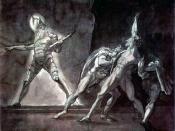Horatio's role in the play is minor and most critics agree that he is not developed beyond a character foil for the great Prince. However, Horatio serves two purposes central to the drama, and it is through these purposes that we can best discuss those qualities that make Horatio memorable. Horatio is our harbinger of truth. It is through Horatio that the actions taken by Hamlet and other characters gain credibility. He is the outside observer to the madness. Hamlet could soliloquize to no end, but it is his conversations with Horatio that ground the play in reality. Horatio believes Hamlet and thus we have permission to believe. He sees the Ghost and so we can believe that Hamlet has seen the Ghost. If Horatio were not there, Hamlet's sanity would truly be in doubt.
Horatio's second purpose is to be Hamlet's one true confidant. Apart from Hamlet's soliloquies, his conversations with Horatio are the only insight we have into what the Prince is really thinking and feeling.
But why Hamlet chooses Horatio to become the sole person on whom he can rely is of primary concern here. From the first scene we see that Horatio is calm, resolute, and rational. Not afraid to confront the Ghost, Horatio demands that it speak if it knows what future awaits Denmark or if it has come to make a confession:
If thou art privy to thy country's fate...
O, speak!
Or if thou hast uphoarded in thy life
Extorted treasure in the womb of earth...
Speak of it, stay and speak! (I.i.133-9)
Hamlet admires Horatio for the qualities that Hamlet himself does not possess. He praises Horatio for his virtue and self-control: "Horatio, thou art e'en as just a man/As e'er my conversation cop'd withal"...


